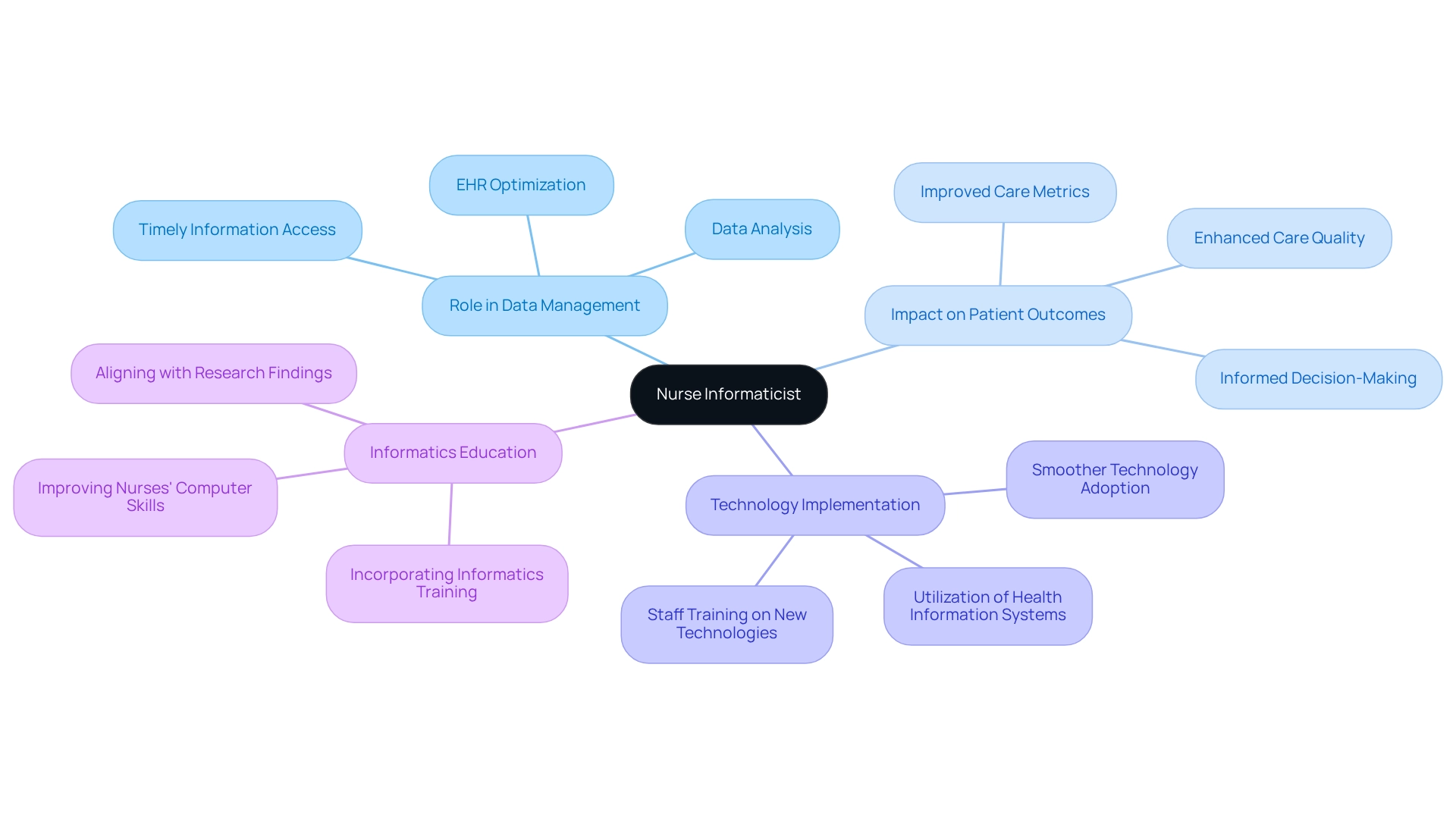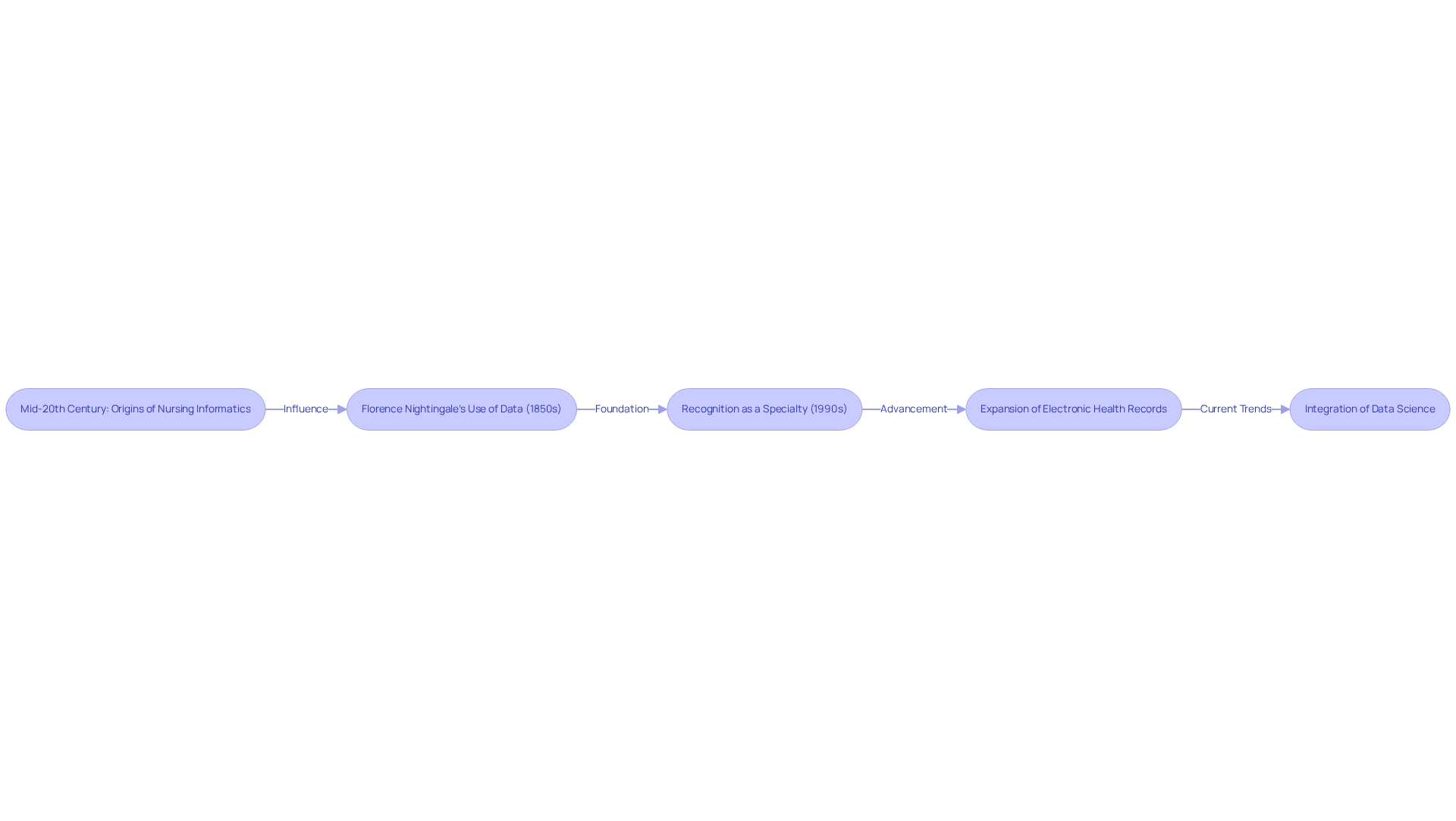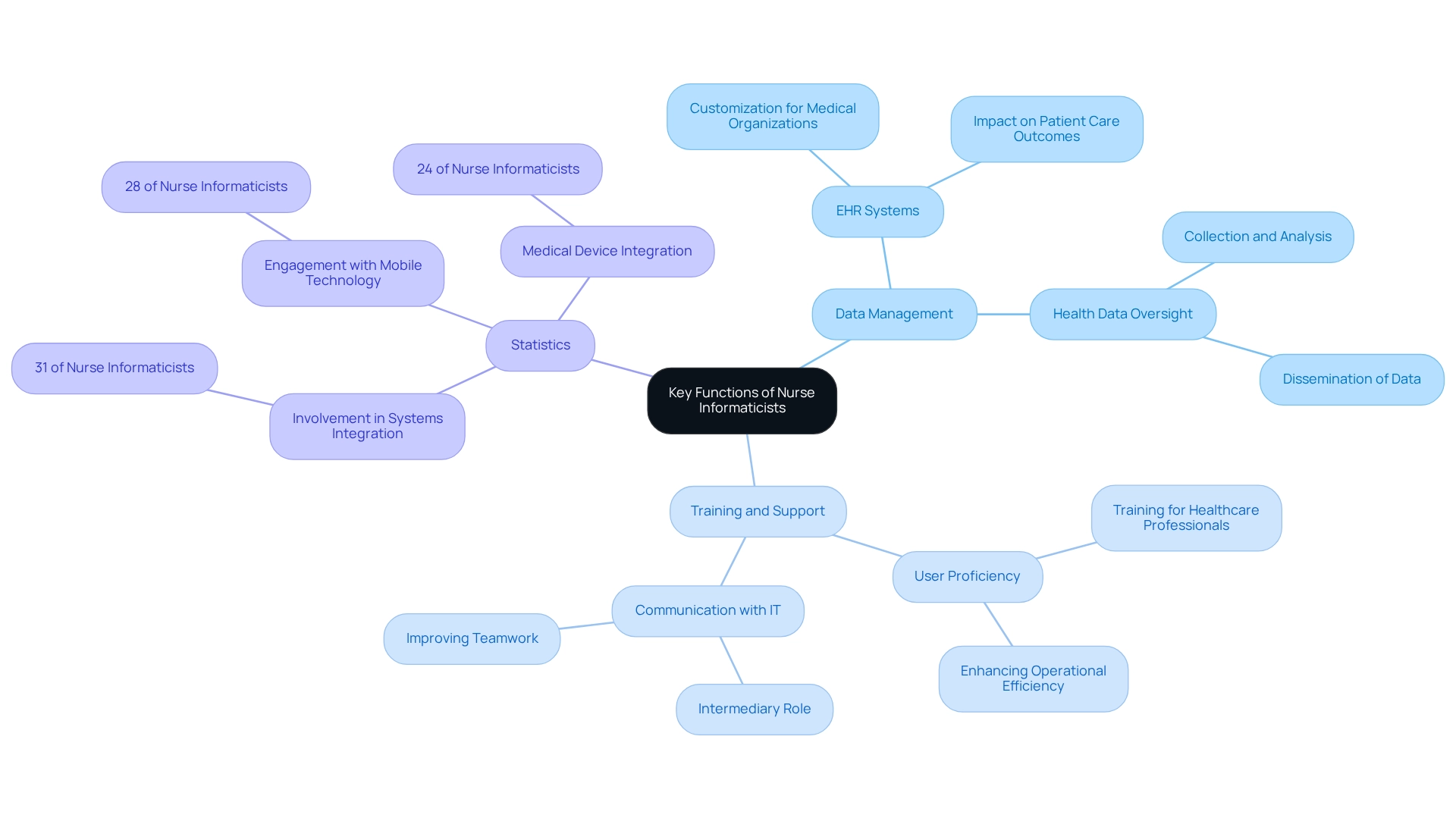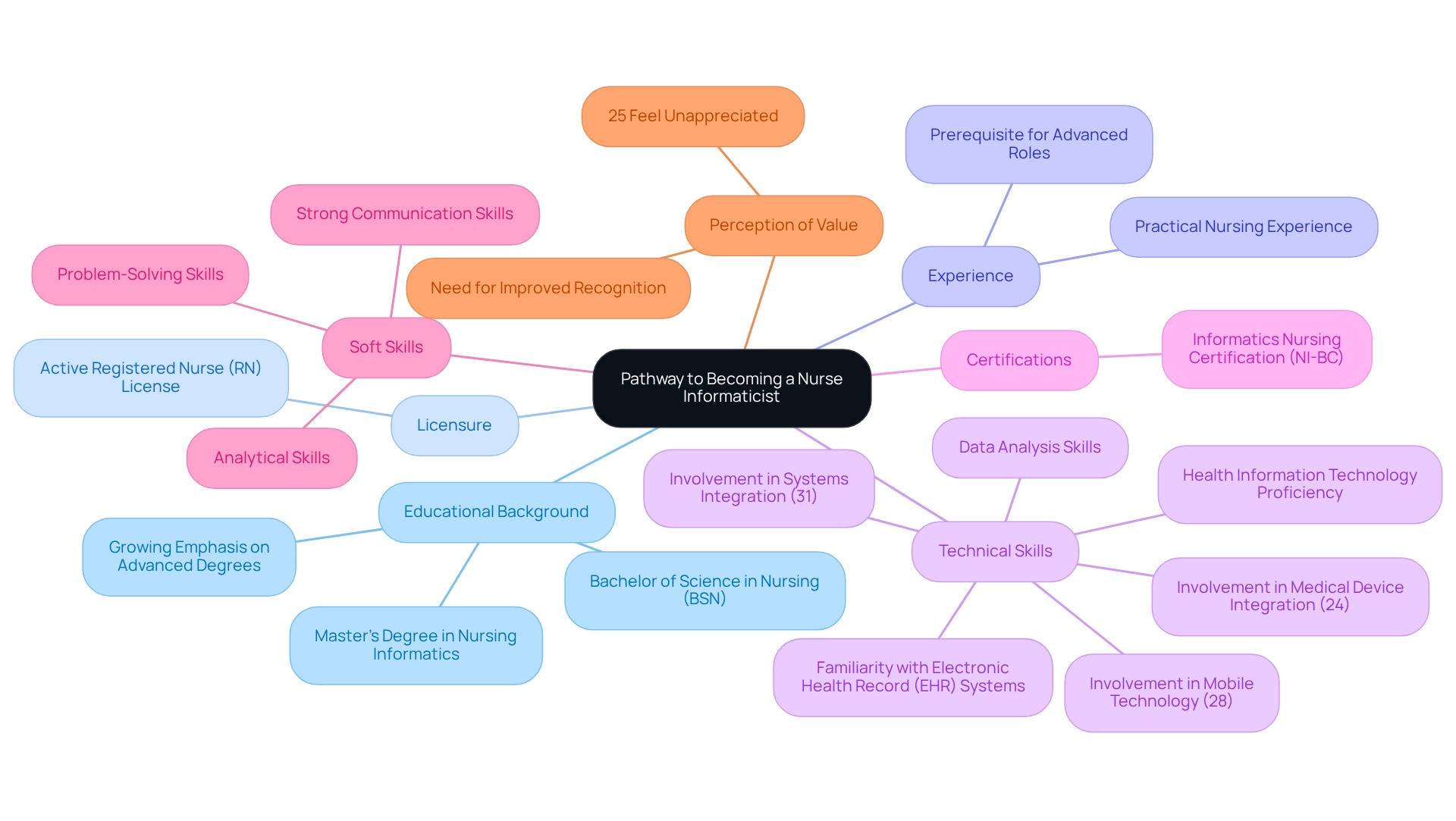Overview
Nurse informaticists are pivotal in healthcare, merging nursing science with information management to elevate patient care through adept data management and technology implementation. Their responsibilities are extensive, encompassing the oversight of electronic health records and the provision of training to healthcare staff. This not only enhances the quality of care but also bolsters informed decision-making in clinical environments. By effectively integrating these elements, nurse informaticists contribute significantly to the overall efficiency and efficacy of healthcare delivery.
Introduction
In the dynamic realm of healthcare, the integration of technology and data is fundamentally reshaping the landscape of patient care. At the forefront of this transformation stands the nurse informaticist—a specialized professional who adeptly bridges the gap between nursing practice and information management.
As healthcare systems increasingly depend on electronic health records and data analytics, the role of nurse informaticists emerges as not only significant but essential. They ensure that healthcare providers have access to accurate information, thereby facilitating informed decision-making and ultimately enhancing patient outcomes.
This article delves into the multifaceted responsibilities, historical evolution, and the pathway to becoming a nurse informaticist, underscoring their critical contributions to modern healthcare.
Define Nurse Informaticist: Role and Importance in Healthcare
A nurse informaticist is a specialized professional who integrates nursing science with information management and analytical sciences to effectively manage and communicate data, information, and knowledge within nursing practice. In the evolving landscape of medical services, where technology and information are paramount to individual care, the role of nursing data specialists has become increasingly vital. They enhance care quality by ensuring that medical providers have access to accurate and timely information, which facilitates informed decision-making and ultimately improves patient outcomes.
In 2025, the significance of healthcare informaticists is underscored by their involvement in the implementation and optimization of electronic health records (EHRs), data analysis, and staff training on new technologies. Their expertise not only bridges clinical practice and technology but also plays a crucial role in shaping medical delivery. Research has demonstrated that strong informatics skills among healthcare professionals correlate with improved care metrics, highlighting the importance of incorporating informatics training into nursing curricula. As Mohammadhiwa Abdekhoda, Assistant Professor of Health Information Management, states, “Nurses’ computer skills should be improved, while incorporating informatics education programmes.”
Moreover, the role of nurse informaticists extends to the implementation of medical technology. Case studies reveal that their involvement in technology adoption leads to smoother transitions and enhanced utilization of health information systems, thereby improving overall care quality. CareSet’s comprehensive Medicare data solutions, operational since 2011, exemplify how data-driven insights can empower medical strategies and foster long-term growth for partners in the field. By leveraging insights from over 62 million beneficiaries and 6 million providers, CareSet enables nursing professionals to enhance care metrics and optimize medical processes. As the medical sector increasingly embraces digital transformation, the pivotal role of nurse informaticists will be essential in ensuring that technology enhances client outcomes and informs market access strategies through improved care metrics.

Trace the Evolution of Nursing Informatics: Historical Context and Development
Nursing informatics traces its origins to the mid-20th century, paralleling the introduction of computers in healthcare environments. Florence Nightingale, often regarded as a pioneering figure in this domain, leveraged statistical data to enhance sanitation and patient care during the 1850s. Her innovative use of data laid the groundwork for future advancements in nursing informatics. As Nightingale famously stated, “To be ‘in charge’ is certainly not only to carry out the proper measures yourself but to see that everyone else does so too.” This quote highlights the leadership role that nursing informatics professionals embody today.
The formal acknowledgment of nursing informatics as a distinct specialty emerged in the 1990s, when the American Nurses Association recognized its critical role in nursing practice. Since then, the field has experienced notable change, especially with the expansion of electronic health records and the increasing focus on data analytics in the health sector. The role of the nurse informaticist is now vital in the deployment of health information technology, ensuring that systems are intuitive and effectively address the needs of both medical providers and patients. This evolution reflects a broader trend in medical care, where clinical nursing expertise increasingly intersects with advancements in data science, natural language processing, machine learning, and precision medicine. CareSet, for example, incorporates more than 100 external data sources for its analysis, emphasizing the significance of comprehensive data in nursing informatics and its role in improving provider engagement.
The development of nursing informatics as a specialty over the decades highlights the role of the nurse informaticist in promoting effective communication and collaboration within medical teams. Case studies have demonstrated that overcoming communication barriers between clinical and IT departments can considerably enhance the implementation of informatics tools, ultimately improving outcomes for individuals. A significant instance is the case study titled “Putting Individuals First: Unlocking Medicare Data to Empower HCP,” which demonstrates how prompt interaction with medical providers regarding treatment choices, such as the 4th line of therapy for Gastrointestinal Stromal Tumor (GIST), can result in improved care for individuals. This treatment option is significant as it represents a critical phase in managing GIST, where informed decision-making by medical professionals can directly impact patient outcomes. As the field continues to evolve, the legacy of pioneers like Nightingale remains a guiding force in shaping the future of nursing informatics.

Detail Responsibilities: Key Functions of Nurse Informaticists in Practice
A range of critical functions essential to the medical system are performed by nurse informaticists. These include:
-
Data Management: They oversee the collection, analysis, and dissemination of health data, ensuring accuracy and accessibility for healthcare providers. This role is vital, as effective data management directly impacts patient care outcomes, and nurse informaticists play a crucial role in the selection and implementation of Electronic Health Record (EHR) systems. They customize these systems to meet the specific needs of their medical organizations, significantly enhancing the success rates of EHR implementations.
-
Training and Support: Providing training to nursing staff and other healthcare professionals on new technologies and systems is a crucial responsibility. Nurse informaticists ensure that all users are proficient and confident in utilizing these tools, which enhances overall operational efficiency. By examining data patterns, nurse informaticists help healthcare professionals identify areas for improvement in care delivery and workflow procedures. Their insights contribute to enhanced healthcare delivery and outcomes for individuals, aligning with the HIMSS Nursing Informatics Committee’s goal of bridging the digital divide in healthcare, which is crucial for the role of a nurse informaticist. Acting as intermediaries between clinical personnel and IT departments, nurse informaticists improve communication and teamwork. This role is essential for enhancing technology application in patient care, ensuring that both clinical and technical perspectives are effectively integrated.
Statistics from unnamed survey participants reveal that 31% of healthcare informatics professionals report involvement in systems integration, while 28% engage with mobile technology, and 24% focus on medical device integration. These figures highlight the diverse skill set and influence of informaticists in modern medical settings.

Outline Skills and Qualifications: Pathway to Becoming a Nurse Informaticist
To embark on a career as a nurse informaticist, individuals typically pursue a structured pathway that includes several key components.
- Educational Background: A Bachelor of Science in Nursing (BSN) is generally required, with many positions favoring candidates who possess a Master’s degree in Nursing Informatics or a related field. In 2025, educational statistics indicate a growing emphasis on advanced degrees in this specialty, reflecting the evolving demands of medical technology.
- Licensure: Candidates must hold an active Registered Nurse (RN) license, which is essential for practicing in this role.
- Experience: Practical nursing experience is crucial, as it equips professionals with the clinical knowledge necessary to address the needs of medical providers effectively. This experience is often a prerequisite for advanced roles in informatics.
- Technical Skills: Proficiency in health information technology, data analysis, and familiarity with Electronic Health Record (EHR) systems are essential. Significantly, 31% of healthcare informatics professionals, such as nurse informaticists, indicated participation in systems integration, 28% in mobile technology, and 24% in medical device integration, highlighting the significance of technical expertise in their positions.
- Certifications: Obtaining certifications in nursing informatics, such as the Informatics Nursing Certification (NI-BC), can significantly enhance job prospects and demonstrate a commitment to the field.
- Soft Skills: Strong communication, problem-solving, and analytical skills are vital for effectively bridging the gap between clinical practice and technology. These abilities allow nurse informaticists to promote innovative solutions that enhance medical service delivery.
Despite the growing acknowledgment of their positions, a case study titled ‘Perception of Value in Nursing Informatics’ revealed that 25% of respondents felt unappreciated within their organizations. This emphasizes the necessity for improved recognition of their contributions, as feeling undervalued can obstruct their capacity to advocate for essential modifications in medical services.
As the healthcare landscape evolves, the pathway to becoming a nurse informaticist continues to adapt, reflecting the growing significance of this role in addressing healthcare challenges. Furthermore, the role of nurse informaticists is crucial in shaping market access strategies, as they leverage their expertise in data analysis and technology to improve patient outcomes and streamline processes.

Conclusion
Nurse informaticists are pivotal in modern healthcare, serving as the essential link between nursing practice and technology. Their key responsibilities—data management, system implementation, training, quality improvement, and interdisciplinary collaboration—enhance patient care by ensuring healthcare providers have access to accurate and timely information.
The progression of nursing informatics, from Florence Nightingale’s groundbreaking initiatives to its current recognition as a specialty, underscores the increasing convergence of clinical nursing and technology. Nurse informaticists play a crucial role in shaping healthcare delivery systems and promoting effective communication within healthcare teams.
As the demand for skilled nurse informaticists continues to rise, the pathway to this profession highlights the significance of education, licensure, and technical proficiency. Continuous learning is vital, empowering nurse informaticists to advocate for innovative solutions that address healthcare challenges.
Ultimately, nurse informaticists stand at the forefront of integrating technology into healthcare, ensuring that it enhances patient care and outcomes. Recognizing and valuing their contributions is essential for advancing healthcare practices in an increasingly digital landscape.


